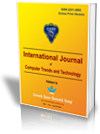Cluster-Based Trust Model for Online Reputation System

A.Deepthi Priyanka , Punugoti Srikanth , Janapati Venkata Krishna. "Cluster-Based Trust Model for Online Reputation System". International Journal of Computer Trends and Technology (IJCTT) V16(1):32-35, Oct 2014. ISSN:2231-2803. www.ijcttjournal.org. Published by Seventh Sense Research Group.
Abstract -
with the rapid development of online reputation systems, Manipulations against such systems are evolving quickly. In This paper, we propose a Cluster based approached theory to protect reputations. Tested against users attack data taken from a cyber-competition, the proposed system has achieved a better performance in terms of accurately identifying unwanted users. It also describes a great conceivable to effectively remove dishonest ratings and keep the online reputation system a secure and fair marketplace. We collect all the information of the user and depend on their rating we get the dishonest users. Cluster based approach means we make the clusters of different types of user on their rating status which are given by the users for different items and make all the security for his/her rating or feedback.
References
1.Yafei Yang, Qinyuan Feng, Yan Sun, and Yafei Dai, “Reputation trap: An powerful attack on reputation system of file sharing p2p environment,” in Proceedings of the 4th International Conference on Security and Privacyin Communication Networks, Sep 2008.
2.M. Abadi, M. Burrows, B. Lampson, and G. Plotkin, “A calculus for access control in distributed systems,” ACM Transactions on ProgrammingLanguages and Systems, vol. 15, no. 4, pp. 706–734, 1993.
3.H. Yu, M. Kaminsky, P. B. Gibbons, and A. Flaxman, “Sybilguard: defending against sybil attacks via social networks,” in Proceedings of the 2006 conference on Applications, technologies,architectures, and protocols for computer communications, pp. 267-278, 2006.
4.A. J_sang and R. Ismail, “The beta reputation system,” in Proceedings of the 15th Bled Electronic Commerce Conference, 2002. [5] J. Weng, C. Miao, and A. Goh, “An entropy-based approach to protecting rating systems from unfair testimonies,” IEICE TRANSACTIONS on Information and Systems, vol. E89–D, no. 9, pp. 2502–2511, Sep 2006.
5.A. Whitby, A. J_sang, and J. Indulska, “Filtering out unfair ratings in bayesian reputation systems,” in Proceedings of the 7th Int. Workshop on Trust in Agent Societies, 2004.
6.J. Zhang and R. Cohen, “A personalized approach to address unfair ratings in multiagent reputation systems,” in Proc. of the Fifth Int. Joint Conf. on Autonomous Agents and Multiagent Systems (AAMAS) Workshop on Trust in Agent Societies, 2006, pp. 89–98.
7.P. Laureti, L. Moret, Y.-C. Zhang, and Y.-K. Yu, “Information filtering via iterative refinement,” in Europhysics Letters, pp. 1006-1012, 2006.
8.Y. Liu and Y. Sun, “Anomaly detection in feedback-based reputation systems through temporal and correlation analysis,” in Proc. of 2nd IEEE Int. Conference on Social Computing, Aug 2010.
9.G. Shafter, A Mathematical Theory of Evidence, Princeton University Press, 1976.
Keywords
Clusters, Reputations, Security


